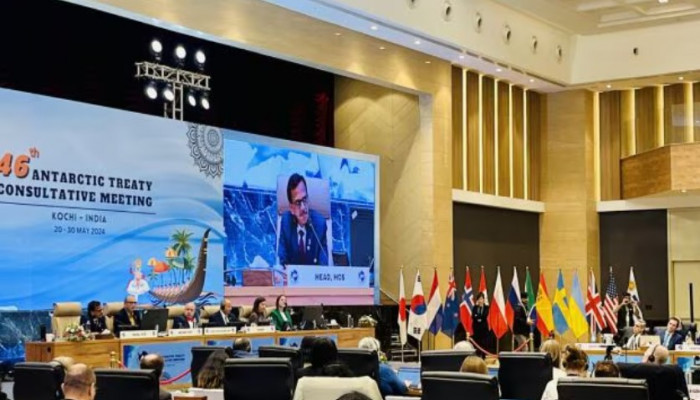India calls for more nations to join Treaty to protect Antarctica
- In Reports
- 07:16 PM, Jun 07, 2024
- Myind Staff
India has advocated for increased participation in the Antarctic Treaty to bolster collective efforts in safeguarding and preserving Antarctica's pristine environment. This call was made during the recently concluded 46th Antarctic Treaty Consultative Meeting (ATCM) hosted by India in Kochi, which saw the participation of representatives from 56 Treaty Parties. Saudi Arabia's recent accession has expanded the Treaty's membership to 57 nations.
The ATCM serves as a platform for deliberations on policy, logistics, legal matters, and administrative decisions pertaining to Antarctica. It convenes policy experts, legal advisors, diplomats, and ambassadors representing the Treaty Parties, fostering discussions aimed at effective governance and conservation efforts in Antarctica.
Antarctica, situated in the southern hemisphere, remains a territory of global interest where governance plays a crucial role among the members of the Antarctic Treaty.
During the Kochi meeting held from May 20 to 30, Thamban Meloth, Director of the National Centre for Polar and Ocean Research (NCPOR) in Goa, emphasised India's stance on maintaining neutrality in its geopolitical policies concerning Antarctica. According to The Indian Express, Meloth stated, "India advocates for inclusivity within the Antarctic Treaty community. We believe that more responsible nations should join the Treaty to secure the future of Antarctica."
The Antarctic Treaty Consultative Meetings serve as a platform for discussing significant decisions related to the governance, conservation, and scientific exploration of Antarctica. Meloth's remarks underscore India's commitment to promoting international cooperation and environmental stewardship in the region.
The fortnight-long international meeting was led by the National Centre for Polar and Ocean Research (NCPOR) under the Ministry of Earth Sciences.
Antarctica, governed by unique regulations beyond those of mainland countries, has seen increasing efforts to promote Equality, Diversity, and Inclusivity (EDI) aimed at preserving its pristine environment in recent years.
During the recent meeting, India emphasised the importance of regulating tourism activities in Antarctica. In a first for the Antarctic Treaty Consultative Meetings (ATCMs), India introduced a third working group of nations tasked with developing policies and regulations to ensure responsible and sustainable tourism practices in Antarctica.
Last week, M. Ravichandran, Secretary of the Ministry of Earth Sciences (MoES), highlighted concerns about the escalating tourism in Antarctica, noting that last year saw a record one lakh visitors to the continent. He stressed the necessity of implementing measures and rules to preserve the Antarctic environment amidst this growth.
India first raised concerns about Antarctic tourism at the Antarctic Treaty Consultative Meeting (ATCM) in New Delhi in 2007. Since then, India has consistently advocated for regulated tourism in Antarctica. At the recent ATCM in Kochi, India initiated the process of developing a framework to regulate tourism activities in the region.
As a Consultative Treaty Party since 1983, India has been conducting regular scientific expeditions to Antarctica. The country operates two research bases, Maitri and Bharati, which are operational both during the summer and winter months.
During the Kochi meeting, India announced plans to replace its 35-year-old Maitri station with a new facility. The next steps involve planning and proposing a design that will undergo environmental compliance reviews before construction commences.
This year’s ATCM in Kochi also welcomed Saudi Arabia as a new Treaty member, bringing the total number of Antarctic Treaty parties to 57. Discussions at the meeting also focused on strategies to prevent the spread of Highly Pathogenic Avian Influenza.
Image source: Indian Express







Comments